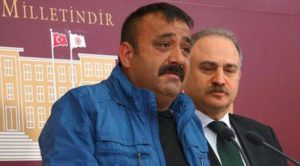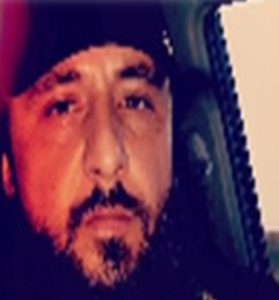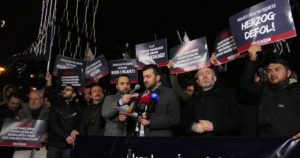Abdullah Bozkurt/Stockholm
A former member of Hizb ut-Tahrir, an outlawed group that calls for reinstatement of the caliphate that was abolished in Turkey in 1924, managed to set up an Islamic State in Iraq and Syria (ISIS) cell in the capital of Turkey while he was under monitoring by Turkish authorities.
The jihadist journey of Abdulkadir Ercan, a 41-year-old Turkish national, started with his introduction to the Turkish network of Hizb ut-Tahrir in 2007, turned to al-Qaeda in 2010 and eventually ended up with ISIS in 2013 in Syria.
Turkish authorities knew he set up an ISIS branch in the town of Sincan, on the outskirts of Ankara, and was raising new recruits for the terrorist organization including many from his own family. Although he was under criminal investigation for multiple crimes, from drug trafficking to membership in al-Qaeda, and facing several court cases, he had been freely moving back and forth between Turkey and Syria.
According to a confidential Turkish government file dated November 2, 2021, and obtained by Nordic Monitor, Ercan has been the subject of 12 criminal investigations by public prosecutors in Ankara and Kilis provinces and 13 criminal cases pursued by courts in the same provinces since 2006.
Yet Turkish authorities had looked the other way when he helped radicalize 20 of his relatives and convinced them to make the trip to Syria to join ISIS. While fighting for jihadist groups, five of his family members were killed in Syrian territory.
His elder brother Alattin, opposed to his brother’s efforts to recruit people for armed conflict and frustrated with the authorities’ unresponsiveness to his pleas to put a stop to the ISIS campaign in Sincan, appeared in the Turkish Parliament in April 2015 to make his case. With the help of the main opposition Republican People’s Party (CHP), he addressed journalists at a press conference to raise the issue publicly and repeated his calls to crack down on ISIS cells in his town.
2021 confidential Turkish government file about ISIS militant Abdulkadir Ercan:
The brother’s public appearance prompted Turkish prosecutors to launch criminal investigations into Ercan, with two arrest warrants issued by courts on August 15, 2015 and December 27, 2015. He was also slapped with criminal charges of threatening to commit murder when he asked his elder brother to stop the public remarks or face death.
Some of Alattin’s relatives in Syria even sent pictures of beheaded men, saying his fate could be similar to that in the photos.

Ercan’s employment records indicate that he had worked for the Sincan Municipality in 2003 and 2004, when Turkish President Recep Tayyip Erdoğan’s ruling Justice and Development Party (AKP) was in control of the town. His involvement with drugs led the police to raid his house several times, and he eventually faced a criminal case on drug possession and distribution charges.
On July 13, 2011 he was arrested during a nationwide al-Qaeda sweep, and police discovered 700 kilograms of explosives in his home. He and 14 other suspects were accused of membership in al-Qaeda and planning to attack the Turkish Parliament and the US Embassy in Ankara. Yet, surprisingly he was let go at the first hearing, held on February 10, 2012. His lawyer was Osman Karahan, a Turkish national with a radical background, during the trial proceedings. Karahan was killed in Syria while fighting for the al-Nusra Front several months after he appeared at the hearing in Ercan’s case, on May 24, 2012.
Turkish authorities could easily have apprehended Abdulkadir Ercan when he was making visits to his hometown of Sincan to recruit new people and help raise support for ISIS between 2013 and 2015. It was only after the case was publicized by the main opposition party and his elder brother’s appearances in the Turkish media that the police and prosecutors started taking action. He remains at large as of today.

Turkey’s crackdown on al-Qaeda groups was dealt a heavy blow when December 2013 corruption cases concerning bribery in Iran sanctions evasion schemes incriminated then-prime minister Erdoğan, his family members and his business and political associates. Erdoğan launched a major shakeup in the police and judiciary, reassigning investigators who were looking into graft as well as al-Qaeda and other radical Islamist groups.
The newly appointed prosecutors and police chiefs killed the corruption probes and suspended all ongoing investigations into al-Qaeda groups starting in February 2014 at the request of the Erdoğan government. Many of the police chiefs, prosecutors and judges who were involved in al-Qaeda cases were purged and/or imprisoned on bogus charges.
Ercan’s case also sheds light on Hizb ut-Tahrir activities in Turkey and how it may have acted as a conveyor belt to move aspiring jihadists into joining al-Qaeda and ISIS. Despite the fact that it was listed as illegal group, it openly operates in Turkey with the help of the Erdoğan government. Hizb ut-Tahrir was given a huge boost when the Constitutional Court, staffed by Erdoğan loyalists, ruled in 2018 that its members had been wrongly prosecuted.
The Constitutional Court simply disregarded a cache of weapons found in a Hizb ut-Tahrir safe house and deviated from precedents that were followed by various criminal courts and consistently upheld in the appeals process by higher courts over the years in Turkey.

The Erdoğan government even allowed the group to organize high-profile events in Turkey including an international caliphate conference in the heart of the Turkish capital, where senior members of the group from various countries gathered to showcase their fight against established governments in the West and East alike.
Hizb ut-Tahrir has been active in Turkey since the late 1960s, and members of the group have been prosecuted from time to time as successive Turkish governments implemented a series of public security measures including the use of the criminal justice system to prevent the fanatical group from mushrooming into a national security threat.
The outlawed group was designated as a terrorist group with a decision of the Supreme Court of Appeals’ 9th Chamber on September 26, 2004 under Article 314 of the counterterrorism law, which deals with armed terrorist groups.
Incidentally, most police investigators, judges and prosecutors who were involved in investigating and trying members of Hizb ut-Tahrir have either been dismissed from their jobs by the Erdoğan government or arrested and jailed since 2015.












